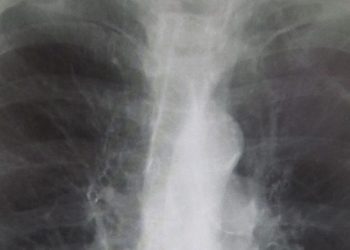Oral gefapixant reduces frequency of refractory or unexplained chronic coughs
1. Gefapixant 45 mg twice a day showed significant reductions in chronic cough over 12-24 weeks compared to placebo.
2. The majority of adverse events were taste-related and mild to moderate in severity.
Evidence Rating Level: 1 (Excellent)
Study Rundown: Chronic cough affects 5-10% of people worldwide. Although current guidelines recommend treating the underlying cause, refractory and unexplained cough is a common phenomenon. Gefapixant, a P2X3 receptor antagonist, may reduce chronic cough by blocking receptors involved in the cough reflex, although current evidence is limited. This study combines findings from two randomized, placebo-controlled, phase 3 trials (COUGH-1 and COUGH-2) to assess the safety and efficacy of gefapixant in patients with refractory or unexplained cough (lasting > 8 weeks). Patients were randomly assigned to one of three groups (placebo, gefapixant 15 mg BID, and gefapixant 45 mg BID) and treated for 12 (COUGH-1) or 24 (COUGH-2) weeks. The primary outcome was mean change in 24-h cough frequency, while key secondary outcomes included mean change in awake cough frequency and a 30% reduction in 24-h cough frequency. According to study results, high dose gefapixant showed significant reductions in daily cough frequency, compared to placebo, at 12 and 24-weeks. However, this was not the same for low dose gefapixant. A limitation of this study is that it was performed on older adults and did not include children below 18 years of age. It would be interesting to see how findings from this study would translate to the pediatric population.
Click to read the study in The Lancet
In-depth [randomized-controlled trial]: Between Mar 14, 2018, and Jul 26, 2019, 1073 (COUGH-1) and 2007 (COUGH-2) patients were screened for eligibility across 20+ countries. Included were those ≥18 years of age with recurrent or unexplained cough for at least 12 months. Altogether, 730 patients in COUGH-1 (243 to placebo, 244 to gefapixant 15 mg, and 243 to gefapixant 45 mg) and 1314 patients in COUGH-2 (435 to placebo, 440 to gefapixant 15 mg, and 439 to gefapixant 45 mg) were included in the analysis. Among enrolled patients, mean age was 59.0 years (standard deviation [SD] 12.6) in COUGH-1 and 58.1 years (SD 12.1) in COUGH-2, and the majority were female. The primary outcome of reduction in 24-h cough frequency was significantly greater in the gefapixant 45 mg group compared to placebo at 12 weeks (mean change 18.5%, 95% confidence interval [CI] 0.9-32.9, p=0.041) and 24 weeks (14.6%, 95% CI 1.426.1, p=0.031). However, this was not the case for gefapixant 15 mg compared to placebo. Gefapixant was generally safe and tolerable, with adverse events affecting 79.2% (578 of 730) of patients in COUGH-1 and 85.3% (1121 of 1314) of patients in COUGH-2. Majority of adverse events were taste-related and mild to moderate in severity. Overall, findings from this study suggest that gefapixant 45 mg may play a role in mitigating refractory or unexplained chronic cough.
Image: PD
©2022 2 Minute Medicine, Inc. All rights reserved. No works may be reproduced without expressed written consent from 2 Minute Medicine, Inc. Inquire about licensing here. No article should be construed as medical advice and is not intended as such by the authors or by 2 Minute Medicine, Inc.







